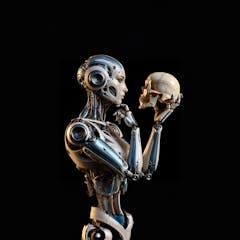
Articles on Robots
Displaying 1 - 20 of 349 articles

Disabled people are experts in using – and designing – assistive technologies. They have lessons to offer everyone about keeping control when help is offered.

Green algae carry drug-loaded nanoparticles directly to the lungs, reducing side effects in other organs and increasing treatment efficiency.

The prevailing human reaction to the idea of artificial intelligence has always been fear, revealed in the way film has portrayed our increasingly important relationship with AI over the years.

Stereotypes can creep in if ‘culturally sensitive’ robots are not designed with great care.

Australian literature is a rich and largely untapped source of information about how Australians think about AI.

Artificial Intelligence’s capacity to mimic and identify emotions is worlds away from the human one to feel.

The next generation of spacesuit needs to do more than simply protect an astronaut from the vacuum of space.

‘Loopy’ is a multicellular robot inspired by biology and designed to react to its environment without instructions on how to do so.

Robots often have a hard time navigating through debris, but robots designed based on worms and snakes could move around obstacles faster, thanks to an idea called mechanical intelligence.

Humanoid robots tend to be white or resemble white people. Here’s why this is a problem and what social scientists, designers and engineers can do about it.

Social robots can be useful tools to help students learn about programming, but here’s why they won’t be replacing classroom teachers anytime soon.

Robotics and AI look set to transform how we carry out domestic work, including caring for other people.

AI poses a variety of ethical conundrums, but the NASA teams working on Mars rovers exemplify an ethic of care and human-robot teamwork that could act as a blueprint for AI’s future.

A study found that adding legs does more for you than having a good sense of the ground around you − if you’re a mobile robot.

New forms of AI are waiting in the wings, but society may decide there are ethical problems using them.

Robots and AI could transform our lives, so we must decide how we want to use them.

Self-service technologies — like self-checkouts or government service kiosks — are decreasing interactions with other people. This may affect our politics and sense of community.

Robots are already carrying out tasks in clinics, classrooms and warehouses. Designing robots that are more receptive to human needs could help make them more useful in many contexts.

Our tendency to view machines as people and become attached to them points to real risks of psychological entanglement with AI technology.

The use of AI and robotic technology in worship is raising profound questions about its long-term consequences. Will it lead to the betterment of society or replace practitioners?
